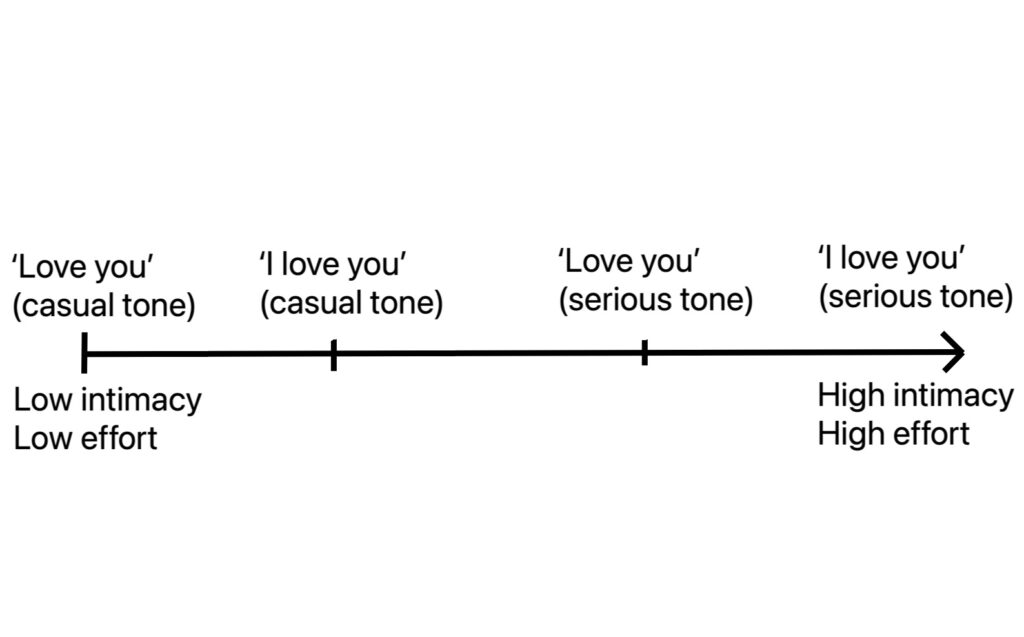Ever gotten a “love you” from your partner that left you wondering what it meant?
What’s the difference between saying “I love you” and “love you”?
‘Love you’ and ‘I love you’ have the same literal meaning. The former is a shortened version of the latter. Both are used to express affection.
However, omitting the pronoun “I” can change the meaning and effect of the message.
Saying ‘love you’ instead of ‘I love you’ comes across as:
- More casual
- Less intimate
- Less involved
- Less vulnerable
- Emotionally distant
Hence, ‘love you’ doesn’t have the same impact on the listener as ‘I love you’. ‘I love you’ sounds and feels much better. The listener feels more special and loved when hearing it.
In contrast to ‘love you’, ‘I love you’ comes across as:
- Serious and sincere
- More intimate
- More involved
- Vulnerable
- Emotionally close
What’s behind this slight but significant difference?
The answer lies in one word: effort.
The more effort you put into something, the more invested you are in that thing. The more invested you are in a person, the more loved and cared for they feel.
This goes back to the unpopular fact that love and relationships aren’t entirely unconditional. We love people who add value to our lives. The more effort they put into the relationship, the more value they create for us.
Omitting the “I” from “I love you” is a way to decrease effort. Hence, it decreases the value of the message. They can’t even be bothered to say “I”. Therefore, they may not be serious.
According to costly signaling theory, the higher the signal cost to the sender, the more likely the signal is honest.
Omitting “I” from “I love you” reduces signaling costs, thereby reducing the perceived value or genuineness of the signal.
It’s like texting “K” instead of “Okay”. “K” is low-effort and tends to annoy the receiver. This is why almost nobody uses ‘ILY’ for ‘I love you’ in texting. That would be really annoying to receive.
Effort isn’t all about the words
While uttering or typing an extra letter does expend effort, effort is more about nonverbal than verbal communication.
For a moment, let’s forget the difference between “I love you” and “love you” and focus on nonverbal communication.
How something is said entails a variation in effort. Facial expressions and voice tone accompanying an utterance require extra effort.
A person can say the same thing differently depending on how they say it and what facial expressions accompany it.
This means someone can say “I love you” to you with or without effort. Hearing “I love you” without effort can feel the same as hearing “Love you”.
1. When someone says ‘I love you’ with effort:
They say it with a tone of excitement and seriousness. The phrase hangs in the end like a question mark instead of stopping like a full stop. They may close their eyes and put their hand on their chest.
2. When someone says ‘I love you’ without effort:
They say it with a flat tone. Much like answering, “The food was okay” when the food wasn’t bad but wasn’t great either. The phrase stops at the end like a full stop instead of hanging like a question mark. It gets uttered with barely any facial expression.
3. When someone says ‘love you’ without effort:
As discussed earlier, removing “I” reduces some effort. But more effort gets removed when it is said in a casual, unexcited, and non-serious tone. And with little to no accompanying body language gestures and facial expressions.
4. When someone says ‘love you’ with effort:
Yes, it’s possible. A person may say “love you” in a sweet and affectionate tone, accompanied by a smile. This more than makes up for the omission of “I” and can definitely feel better than a bland ‘I love you’.

What to do when someone says ‘love you’ instead of ‘I love you’?
If they say it with a good amount of effort, you wouldn’t feel much difference. If they say it without effort, that’s okay, too, because certain situations force us to exert lesser effort in what we’re saying:
1. They’re in a hurry
If they’re in a hurry, they don’t have time to put extra effort into the message. It has nothing to do with you and doesn’t mean they care less.
2. They’re distracted
They may be distracted by something in their environment or internally by something on their mind. They don’t have the mental resources to spare to put more effort into their message.
3. They’re tired
When we’re tired, we don’t like to put effort into anything. Their effortless ‘I love you’ or ‘love you’ may bother you, but you must also consider their mental state.
4. The conversation is casual
It’s hard to inject seriousness and emotional intimacy into a casual conversation. If the mood of the conversation is relaxing and casual, you can’t expect someone to share their deepest, innermost feelings.
As soon as they do, the atmosphere of the conversation changes.
The only situation that’s worrying
It’s difficult to tell whether someone is making an effortless declaration of love for the above reasons or out of emotional distance. They could be doing it for more than one reason. Unfortunately, you can’t put a camera into someone’s head to figure out their intentions.
Lovers use a mix of effortful and effortless ‘I love you’s and ‘love you’s. That’s normal. What’s concerning is using effortless declarations of love most or all of the time. That may be an indication that there’s a lack of emotional intimacy in the relationship.

